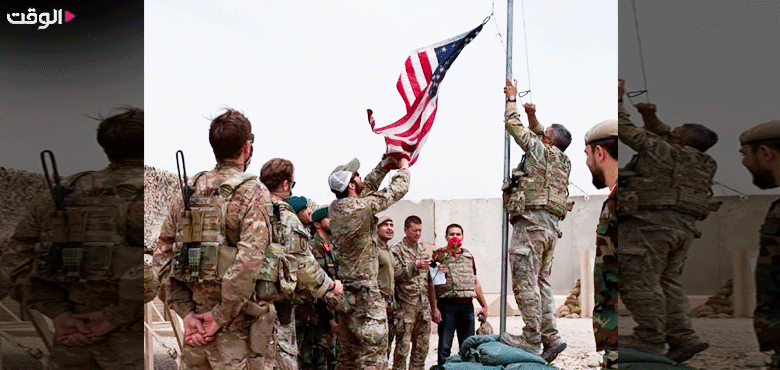Alwaght- The US military flee from Kabul that echoed their escape from Vietnam in 1975 marked a defeat of Washington in its longest war in the US history. A defeat whose signs appeared years ago but various administrations deceptively tried to conceal the realities of war from the American and world public opinion. The fruitless war ended with the most disgraceful way possible, leaving thousands dead and hundreds of billions of dollars wasted, with scenes of American soldiers fleeing, while Taliban fighters marching triumphantly on tanks and planes as war spoils paid for by Uncle Sam borrowing from American taxpayers.
Videos taken from the Kabul airport show that the 6,000 US troops sent there could not even secure American personnel and nationals around the runway to exit. A military flight can carry 640 people, and more than 10,000 Americans are said to be still waiting for their turn. The American authorities are so confused they cannot even present the exact number of their nationals in Afghanistan to the media.
Since September 11, 2001, the US spent over $2 trillion on its war in Afghanistan, namely every day $300 million, or $50,000 per a single Afghan of total 40 million population. To put it simple, Uncle Sam spent on an empty slogan (counterterrorism) in Afghanistan more than the wealth of Jeff Bezos, Elon Musk, Bill Gates, and 30 other American billions combined.
That includes $800 billion in direct war spending and $85 billion in training for the Afghan army, which collapsed in the weeks following the sudden closure of Bagram Air Base in early July.
According to Forbes, the US ran the war in Afghanistan with borrowed money. Researchers at Brown University estimate that more than $500 billion in loan installment (for the total of $2.26 trillion) have been paid, and they estimate that by 2050 the total interest for Afghanistan war debt could reach $6.5 trillion. That is $20,000 per US citizen.
The US military human toll even highlight the scale of defeat. 2,500 American troops were killed and nearly 4,000 American civil contractors are also among those killed over the past two decades.
Now the American public question for what benefits 2,500 soldiers were killed, 20,000 injured, and over $2 trillion were spent. The Taliban return to power marks a great defeat to the US in its history.
The US administrations have long blamed the Afghan military to justify their defeat and withdrawal from Afghanistan. "Our allies [in Afghanistan] do not fight," this is what Obama, Trump, and now Biden said. This is while in the reality tens of thousands of Afghans, including 69,000 police forces and 47,000 civilians, were killed in these years.
Saying that after Osama bin Ladan's death the battle ended and the US did not go to Afghanistan for democracy are other justifications to alleviate the pressures of defeat.
Right at the beginning of Afghanistan war, the Americans, excited by the end of Cold War and entry to the unipolar world order, considered themselves the police of the world and, like in the Crusades, granted themselves the ethical qualifications to spread democracy.
With demagogic slogans mixed with idealistic sentiments, they claimed to punish the perpetrators of terrorism all over the world, especially those who killed American civilians in 9/11 attacks. And so the US entered a country like Afghanistan under the same slogans.
Dominic Tierney, in his book "The Right Way to Lose a War: America in an Age of Unwinnable Conflicts" tells the Time magazine that "one of the great tragedies of the Afghanistan war is that the United States could have got a much better result back in 2002 by negotiating a deal with the Taliban. In 2002, the Taliban reached out to the United States and basically said, Look, we’ve lost. If you offer us some kind of place in the new Afghanistan, we’re willing to evolve into a political party. The Bush Administration did not even consider it because at the time al-Qaeda and the Taliban were sort of lumped together in this bucket of Bad Guys, Evildoers, Nazis almost. And so we weren’t willing to kind of make a deal."
The US and its allies within two months of operation announced "liberation" of Kabul from the Taliban. Two years later, in May 2003, Defense Secretary Donald Rumsfeld, told a press conference that "major combat operations are over." But they were not over anyway.
Successive administrations deceived the American public and painted the battleground in Afghanistan "wonderful" while it was not so. The US was in a quagmire in Afghanistan as was in Vietnam decades before. In his memoirs, Rumsfeld wrote that the US had no maps and was relying on "old British Empire maps" of Afghanistan when it invaded the Central Asian country.
Researches find that the US has barely won a war after WWII. Is this the new American reality?
"Korea was a really tough stalemate. And since Korea, we have had Vietnam—America’s most infamous defeat—and Iraq, another major failure. And you can even add other conflicts like Libya, like Somalia," Tierney tells the Time.
And now Afghanistan is the symbol of the biggest American history defeat.
Afghanistan is the "graveyard of the empires", either the 19th century British Empire or the 20th century Soviets. This is the lesson a majority of the colonialist powers have so far learned.
The US has sustained a historic defeat from the Taliban. The longest US war, starting in 2001, ended in 2021 in disgraceful defeat.
As a superpower, the US is considered nosediving. This questions its qualification for leadership of political and military blocs, as well as its credibility as a reliable ally in international conflicts and rivalries. If the US miscalculates this big about Afghanistan and incurs a disgraceful defeat, then how can others trust its calculations and promises of support in East Asia or South China Sea or West Asia?



























